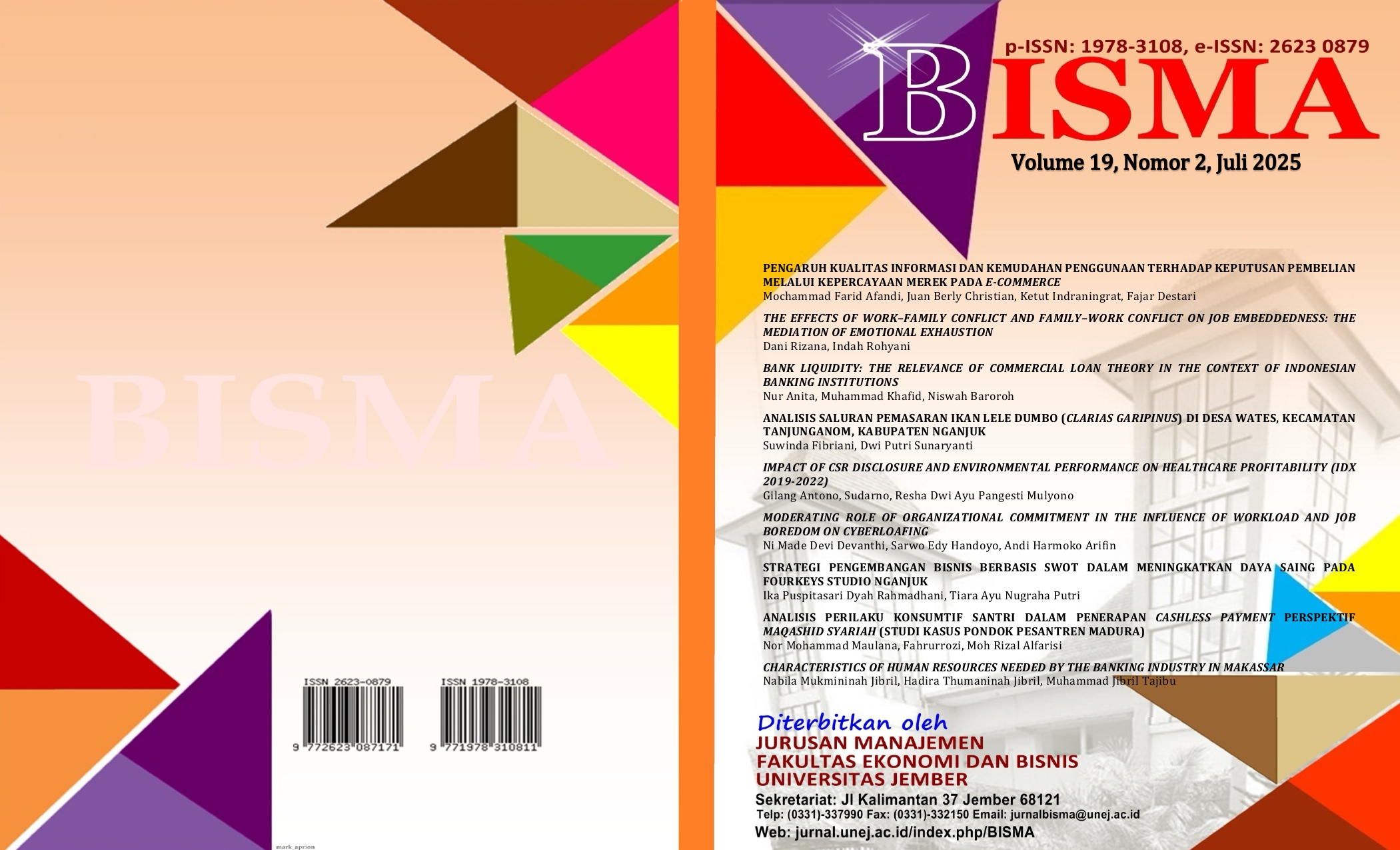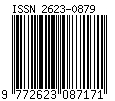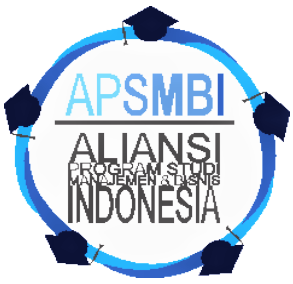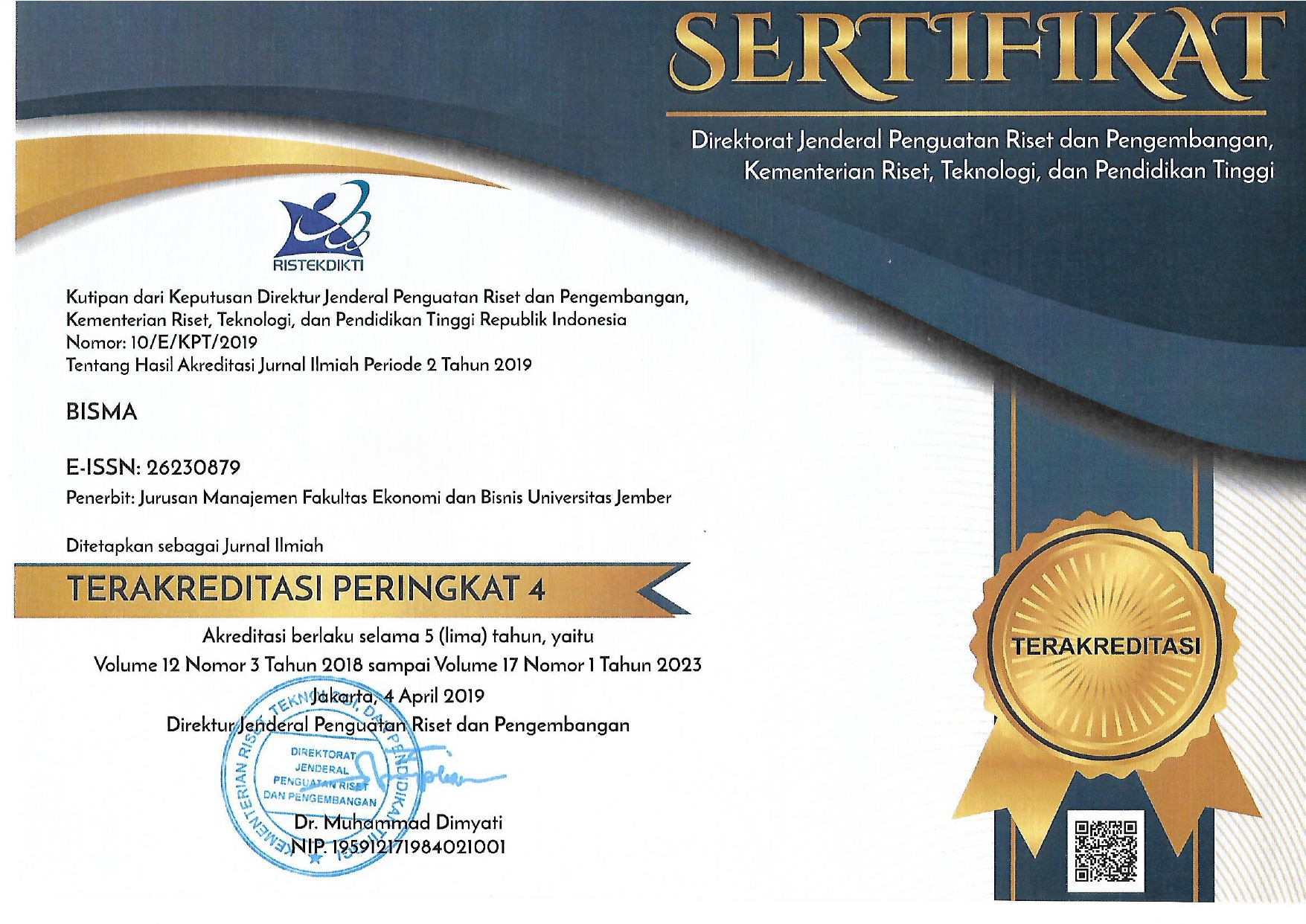CHARACTERISTICS OF HUMAN RESOURCES NEEDED BY THE BANKING INDUSTRY IN MAKASSAR
DOI:
https://doi.org/10.19184/bisma.v19i2.53771Keywords:
Cochran Q-test, Banking , Characteristic, Human Resources, MakassarAbstract
This study aims to determine the characteristics of human resources (HR) that are needed by banks in recruiting employees. The study was conducted by distributing questionnaires to banks that were the research samples consisting of 10 banks, both conventional and sharia in Makassar. The questionnaire results were then processed using the Cochran Q test analysis tool, to determine the similarity of opinion among respondents regarding the indicators that are considered to be the characteristics of the required HR. Based on the analysis results, the criteria for human resources that are needed by the banking industry are having a high education, having a background in management and other sciences, having work experience or having an internship while studying, having computer and foreign language skills, communication skills, and having work discipline. The implication of this research is on the development of curriculum in higher education so that it is in line with the needs required in the banking industry, and so that college graduates can be absorbed. This research fills the gap by focusing on the specific HR attributes prioritized by banks in Makassar, a topic that has received limited attention in previous studies.
Downloads
References
Agbo, M. U. (2020). Effects Of Benchmarking On Performance Of Manufacturing Firms: A Study of Nigerian Breweries Plc. Enugu, Enugu State, Nigeria. International Journal of Business & Law Research, 8(2), 13–20. https://doi.org/10.9790/487X-2205033440
Agustini, S. I., & Sari, E. P. (2021). Pengaruh Latar Belakang Pendidikan, Pengembangan Karir dan Insentif Terhadap Kinerja Karyawan Pada PT. Sun Mega Rezeki Tayarindo Medan. Jurnal Widya, 4(April), 226–239. https://doi.org/https://doi.org/10.54593/awl.v5i1.289
Al-Fa’izah, Z., Rahayu, Y. ., & Hikmah, N. (2017). Perencanaan Sumber Daya Manusia Kesehatan (SDMK) di Kabupaten Jember. Jurnal Bisnis Dan Manajemen (Bisma), 3(3), 69–70.
Al-Husseini, S. (2023). Intellectual capital dimensions and employee performance: The mediating role of organizational learning. Cogent Business and Management, 10(3). https://doi.org/10.1080/23311975.2023.2284437
Ariansyah, A., & Caesar, L. (2024). Pengaruh Kompetensi Bahasa Asing terhadap Produktivitas. Journal of Information System and Management, 03(02), 87–89. https://doi.org/https://doi.org/10.4444/jisma.v4i3
Arifin, S., & Firmansyah, F. (2017). Pengaruh Tingkat Pendidikan Dan Kesempatan Kerja Terhadap Pengangguran Di Provinsi Banten. Jurnal Ekonomi-Qu, 7(2). https://doi.org/10.35448/jequ.v7i2.4978
Aslam, M. (2023). Cochran’s Q test for analyzing categorical data under uncertainty. Journal of Big Data, 10(1). https://doi.org/10.1186/s40537-023-00823-3
Badan Pusat Statistik. (2024). Tingkat Partisipasi Angkatan Kerja Menurut Jenis Kelamin, 2024. https://www.bps.go.id/id/statistics-table/2/MjIwMCMy/tingkat-partisipasi-angkatan-kerja-menurut-jenis-kelamin.html
Bhatt, M., Joshi, P., & Bariya, S. (2023). a Study on the Impact of Hr Practices on the Profitability and Performance of Business. Journal of Strategic Human Resource Management, 12(1), 01–08. https://doi.org/10.16962/eapjhrmob/issn.2394-0409/20140930.v1i1.05
Bhavani, P. (2020). A Study on Employee’s Discipline and Its Effect on Organizational Performances. International Journal of Business and Management Invention (IJBMI) ISSN, 9(6), 1–04. https://doi.org/10.35629/8028-0906040104
Cahya, R. D., Kistyanto, A., & Wardoyo, D. T. W. (2024). The Influence of Emotional Intelligence, Intellectual Intelligence, Spiritual Intelligence on Employee Performance of Employees of the Fire And Recue Services of Surabaya City. Jurnal Sejarah, Pendidikan Dan Humaniora, 8(2), 12549–12558. https://doi.org/10.2991/aebmr.k.201212.076
Darwis, M., Utami, N. N., & Saleh, S. (2023). The Effect of Information Technology on Employee Performance at the Makassar City Communication and Information Service. Pinisi Journal of Education and Management, 2(1), 61. https://doi.org/10.26858/pjoem.v2i1.46410
Dhammawan, V., Nugraha, H. S., & Dewi, R. S. (2024). Pengaruh Modal Intelektual Terhadap Kinerja Karyawan Melalui Kepemimpinan ( Studi Pada Perusahaan Pengembang Kawasan Huni PT. X Kota Bekasi. JIAB: Jurnal Ilmu Administrasi Bisnis, 13(3), 570–578. https://doi.org/https://doi.org/10.14710/jiab.2024.42329
Enyan, M., Bangura, J. N. B., Mungue, M. P. A. A., & Abban, O. J. (2023). Impact of Communication on Employees’Job Satisfaction : A Review. EPRA International Journal of Multidisciplinary Research (IJMR)-Peer Reviewed Journal, 9(7), 198–210. https://doi.org/10.36713/epra2013
Gharti, A. (2023). Information and Communication Technology (ICT) and Employee Performance: Relationship. Nepal Journal of Multidisciplinary Research, 6(2), 84–96. https://doi.org/10.3126/njmr.v6i2.57220
Helmiatin. (2015). Optimalisasi Peran Modal Intelektual Terhadap Kinerja Karyawan. Etikonomi, 14(April), 51–68. https://doi.org/10.15408/etk.v24i1.36338
Hernanda, V. A., Azzahra, A. Y., & Alfarisy, F. (2022). Pengaruh Penerapan Bahasa Asing dalam Kinerja Pendidikan. Jurnal Indonesia Sosial Teknologi, 3(02), 287–292. https://doi.org/10.36418/jist.v3i2.367
Herusetya, A., Prabowo, H., & Sari, S. A. (2006). Analisis Pengaruh Peminatan Jurusan Ekonomi Manajemen terhadap Bidang Kerja Lulusan: Studi Kasus Lulusan Jurusan Ekonomi Manajemen Universitas Bina Nusantara Tahun 2000 – 2004. The Winners, 7(1), 26. https://doi.org/10.21512/tw.v7i1.609
Hirarto, A. A., & Sartika, M. (2021). Faktor-Faktor yang Mempengaruhi Kinerja Karyawan Perbankan: Studi pada PT. Bank Rakyat Indonesia (Persero) Cabang Batang. Velocity: Journal of Sharia Finance and Banking, 1(1), 10–25. https://doi.org/10.28918/velocity.v1i1.3643
Jibril, H. T., Susilo, S., & Sakti, R. K. (2022). Pemodelan Tingkat Pengangguran Di Indonesia Dengan Random Effect Spasial Autoregression (Sar-Re) _ Jibril _ JPPI (Jurnal Penelitian Pendidikan Indonesia). Jurnal Penelitian Pendidikan Indonesia (JPPI). https://doi.org/https://doi.org/10.29210/020221721
Jibril, N. M., Natsir, M., Choldum, M., Setyadi, S., & Romadloni, M. (2023). The Influence of Intellectual Intelligence , Emotional Intelligence , and Spiritual Intelligence on the Performance of Female Employees at PT . Bank Rakyat Indonesia ( Persero ) Tbk Regional Office Malang. East African Scholars Journal of Economics, Business and Management, 4464(10), 349–358. https://doi.org/10.36349/easjebm.2023.v06i10.001
Karim, K. (2015). Manajemen Sumber Daya Manusia (M. J. Tajibu (ed.); 1st ed.). Dream Litera. www.dreamlitera.co
Karim, K. (2018). Peningkatan Prestasi Kerja Karyawan Sektor Perbankan Melalui Motivasi Kerja. Jurnal Manajemen Perbankan Keuangan Nitro, 1(2), 76–81. https://doi.org/10.56858/jmpkn.v1i2.8
Karim, K., & Jibril, H. T. (2019). Women’S Decisions To Be an Entrepreneurship in the Informal Sector in Makassar. Hasanuddin Economics and Business Review, 3(2), 80. https://doi.org/10.26487/hebr.v3i2.2028
Muduli, A., & Trivedi, J. J. (2020). Recruitment methods, recruitment outcomes and information credibility and sufficiency. Benchmarking, 27(4), 1615–1631. https://doi.org/10.1108/BIJ-07-2019-0312
Nasrullah, A., & Pohan, E. S. (2020). Intellectual Capital Dan Spiritual Capital Terhadap Business Performance Pada Perusahaan Manufaktur Di Banten. Jurnal Riset Akuntansi Tirtayasa, 5(1), 14–31. https://doi.org/10.48181/jratirtayasa.v5i1.7973
Ompusunggu, M. Z., Prawabani, B., & Dewi, R. S. (2024). Pengaruh Pengembangan Karir dan Kompetensi Tehadap Kinerja Karyawan Dengan Kepuasan Kerja Sebagai Variabel Intervening (Studi Pada Karyawan Bank Jateng Cabang Utama). Jurnal Ilmu Administrasi Bisnis, 13(3), 789–800. https://doi.org/10.14710/jiab.2024.43681
Opatha, H. H. D. N. P. (2021). A Simplified Study of Definitions of Human Resource Management. Sri Lankan Journal of Human Resource Management, 11(1), 15. https://doi.org/10.4038/sljhrm.v11i1.5672
Qodriah, S. L., Nurrohman, F., & Hartati, W. (2023). Pengaruh Pengalaman Kerja dan Disiplin Kerja terhadap Kinerja Karyawan pada UD Shahila Jaya Food. Journal of Accounting and Business Studies, 7(1), 25–37. https://doi.org/10.61769/jabs.v7i1.581
Quinones, M. A., Ford, J. K., & Teachout, M. S. (2001). the Relationship Between Work Experience and Job Performance: a Conceptual and Meta‐Analytic Review. Personnel Psychology, 48(4), 887–910. https://doi.org/10.1111/j.1744-6570.1995.tb01785.x
Ratnawati, E., Sukidjo, & Efendi, R. (2020). The Effect of Work Motivation and Work Experience on Employee Performance. International Journal of Multicultural and Multireligious Understanding, 1(April), 145–152. https://doi.org/10.18415/ijmmu.v7i8.1809
Sulaiman, N. S., Abdullah, Z., & Man, N. I. (2023). The Effect of Employee Communication and Engagement on Organisational Performance: A Conceptual Study. International Journal of Accounting, Finance and Business, 8(46), 233–251. https://doi.org/10.55573/IJAFB.084616
Wahyono. (2023). Penyebab Banyak Lulusan Perguruan Tinggi Sulit Mendapat Kerja, Persaingan hingga Skill Tak Cocok. In Sindonews.com. Sindo News. https://edukasi.sindonews.com/read/1208317/211/penyebab-banyak-lulusan-perguruan-tinggi-sulit-mendapat-kerja-persaingan-hingga-skill-tak-cocok-1695442177
Worokinasih, S., Fuaida, R., Imamah, N., & Nuzula, N. F. (2023). Pengaruh Social Capital Dan Intelectual Capital Terhadap Firm Performance. BISMA: Jurnal Bisnis Dan Manajemen, 17(3), 211. https://doi.org/10.19184/bisma.v17i3.44271
Zacky, M., & Anisatus Sholihah, R. (2023). Pengaruh Tingkat Pendidikan Terhadap Kesempatan Berkarir (Studi Kasus Pada Masyarakat Kabupaten Batang). Jurnal Sahmiyya, 2(1), 1–6. https://doi.org/Prefix 10.28918
Downloads
Published
Issue
Section
License
Copyright (c) 2025 Nabila Mukmininah Jibril, Hadira Thumaninah Jibril, Muhammad Jibril Tajibu

This work is licensed under a Creative Commons Attribution-ShareAlike 4.0 International License.












.png)
 Bisma: Jurnal Bisnis dan Manajemen is licensed under a
Bisma: Jurnal Bisnis dan Manajemen is licensed under a 